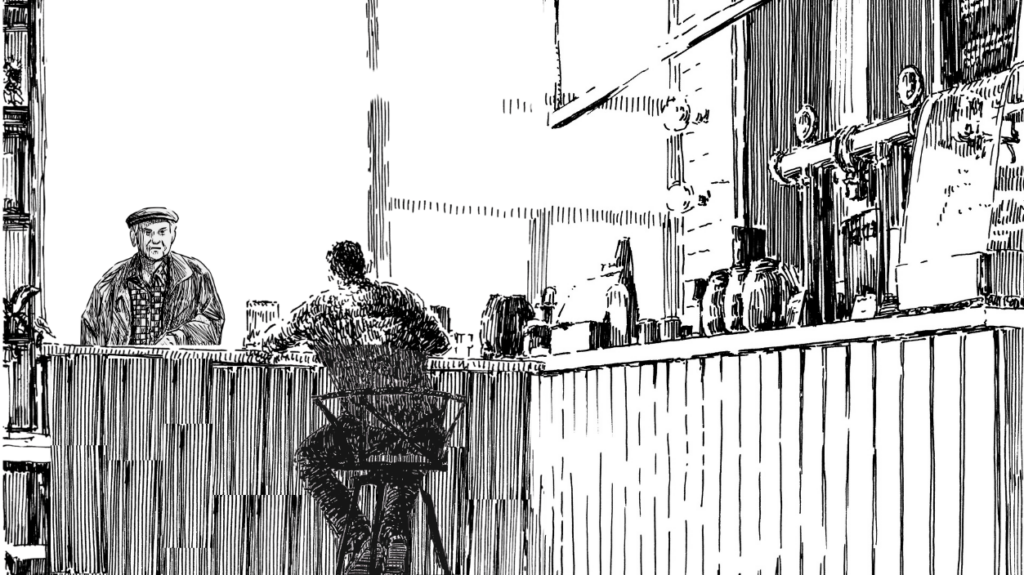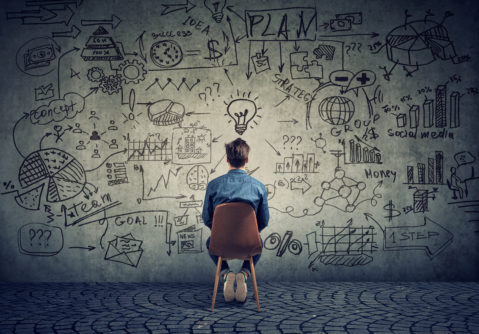Bill Kauffman, in a recent episode of Givers, Doers, & Thinkers, paints a sad portrait of an overly mobile and centralized world while describing the healthier communal life of small town America.
We’re less than two weeks away from the next presidential election, and you could cut the cultural tension with a knife. I have friends judging the quality of a neighborhood based on the number of Trump signs and others judging the quality of a neighborhood based on the number of Biden signs. They aren’t looking for parks or bike paths, coffee shops or watering holes. They want to know, at a quick glance, the political allegiance of their neighbors.
That’s an odd phenomenon, and it’s the unwitting subject of Jeremy Beer’s conversation with localist author Bill Kauffman in a recent Givers, Doers, & Thinkers. Bill is a localist from before localism was cool. Indeed, the “father of localism,” Bill played a role in advancing the thought and interest in localism today. A former legislative assistant to Senator Daniel Moynihan, Bill returned with his wife to his small hometown of Batavia, New York in 1988 and has been there (or a few miles north, as Jeremy emphasizes) ever since.
Bill writes about localism not as an admirer of bygone generations, not as a mobile millennial with “craft” interests in whatever town they find themselves in now, but as a lifelong resident of a small town with not much to celebrate by mainstream cultural standards. He is involved not in local politics—as a rule, he says—but in local culture, from the local museum, to the professional baseball team, to helping to host celebrations for Batavia’s one homegrown novelist, John Gardner. Not one of Bill’s favorites, he admits, but his and theirs, which is a matter of significance even if Gardner is less excellent than a Sinclair Lewis.
EMBODIED RELATIONSHIPS
Small town associations give real persons the opportunity to know other real persons—their neighbors with whom they work and live and collaborate on a regular basis. He describes two gentlemen who worked together, one very “out” and the other a leader of the local Assemblies of God community. If they lived on the internet, as so many of us do today, they would have hated each other. But as neighbors who lived and worked together, they had a “multi-dimensional relationship.” They were more to each other than merely the characteristics that divided them.
Unfortunately, most of us today don’t have these multi-dimensional relationships. We know our neighbors (if the stranger in the metropolitan apartment complex can be called such) along flat planes, wondering first and foremost whether they would put up a Trump sign or a Biden sign.
This, it goes without saying, is destructive of civil society, and it’s destructive, moreover, of our own happiness and wellbeing. If we can’t work with those with whom we disagree—even significantly disagree—then we can’t build those local institutions that provide some meaning, some friendship, some happiness in our lives. We’re left adrift, looking for Biden signs or Trump signs as we move from neighborhood to neighborhood in a strained effort to “go far.”
And this is where we find ourselves: strained friendships and strained families, with thin relationships that exist in the first place online, if at all. And we know—now especially, in the middle of October 2020, approaching a very strained and tendentious election—this obsession with the two parties of our centralized Leviathan, coupled with a strange expectation that somehow this president or that will make things better. And we know that our society has been trending this way for a long time—towards an online existence with digital “communities” and an increasing focus on the federal government and the presidency in particular.
One wonders if there’s a way out, or if we are doomed to suffer under this Leviathan, doomed to endure loneliness and hyper-mobility, waiting for the next election to make things better.
GREEN SHOOTS
Having teased listeners along, hearing about the virtues of localism and the modern trends that make it difficult, Jeremy asks Bill for “a little bit of hope amid the darkness.” Here Bill confesses that he’s an “innately hopeful guy,” and he also reminds us that “despair is a sin—but it’s also no fun.” So Bill muses about those “green shoots,” some trends that underwhelm the centralizing bureaucracy that alienates and displaces us.
Looking for those green shoots, Bill unblinkingly asserts that voting “is meaningless for the most part.” This might be overstated, but his point is to say that if you want to realize or advance some good in your town or your community, then you need to do more than cast a ballot every year or every four years—or every so often when there’s someone you like. There’s voting with your dollar and voting with your time that carries a great deal more significance than your anonymous ballot cast in early November.
Bill isn’t doe-eyed, of course. He knows that sometimes we need to shop at the big box stores, even as they destroy or have destroyed our local economies. But as and when possible, we should make the decision to go to the local coffee shop over the chain, or the local bookstore over Amazon, or the local greenhouse over Home Depot … and so on. There may be a sacrifice of time and there’s likely a sacrifice of cost: too often (though not always!) these local businesses can’t compete with the prices from the chains and big box stores. That sacrifice, however, is a vote for a local community—your local community—and for thicker and multi-dimensional relationships in lieu of the flat anonymity of our dense and monolithic metropolises.
BRIGHTENING YOUR CORNER
The promise of thriving local communities, of at least a thread of hope for a less centralized, big-box future, can be seen in a growing interest in farmer’s markets and CSAs, or in local breweries and coffee shops.
Now these are small and nascent starts. They don’t have the robust communal heft that a Kiwanis or a Rotary club had fifty years ago (which Bill insists were of immense importance at the time). Shoppers’ interests are often aesthetic or even political: “localism” is too often a movement of taste more than value, and so these green shoots seldom offer the multi-dimensional relationships that Bill describes.
Nevertheless, they are signs of hope that we aren’t doomed to an unmitigated march toward tech centralization with an unrelenting hollowing out of America’s small towns.
We don’t need “big plans” to find shimmering signs of hope. Here’s the main thing from Bill: “try to brighten the corner where you are.” “If enough people do that,” Bill tells us hopefully, “you get positive change.”






